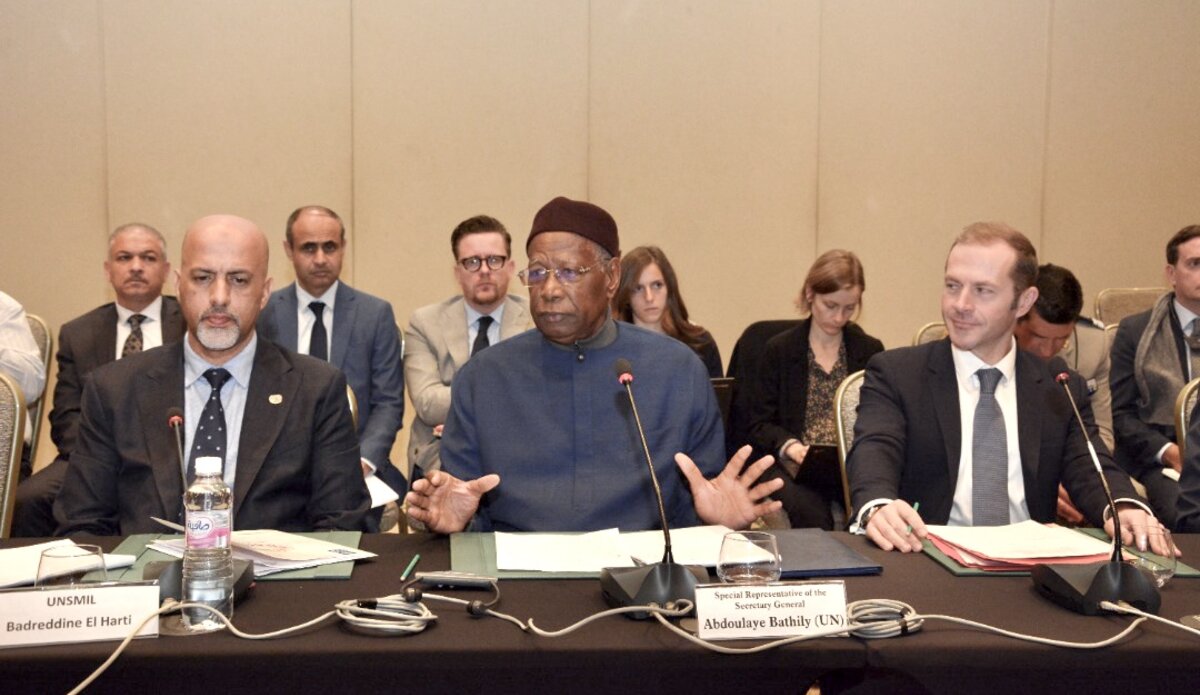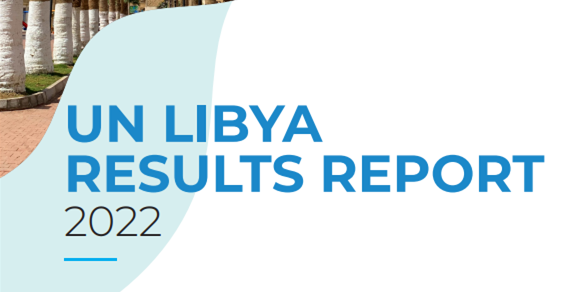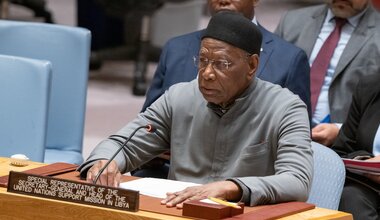SRSG Abdoulaye Bathily opening remarks at the meeting of Security Working Group for Libya
It is a great pleasure for me to participate in this important meeting today, bringing together the members of the Berlin Process for a discussion on the next steps in the implementation of the ceasefire agreement and the reunification of Libya’s military institutions.
I am equally pleased to welcome the participation of the 5+5 Joint Military Commission and officials from the Ministry of Interior.
I wish to acknowledge, in particular, Chief of Staff of the Libyan Army, General Mohamed Al Haddad, who has joined us today.
My sincere appreciation goes to the Libyans who accepted to attend today’s plenary session of the Security Working Group of the Berlin Process.
Since arriving in Libya less than two months ago, I have focused my attention on meeting Libyans from all walks of life, and from every part of the country, to hear their concerns about the situation in their country and listen to their views on ways to overcome the crisis. Close to three million of voters have registered for elections, demanding their right to choose their leaders.
I have recently expanded my consultations with regional actors to encourage them to give their support to Libyan efforts to find consensual solutions to lead the country to elections and put an end to the legitimacy crisis it is facing.
Today, I ask you all to stand unanimously behind those Libyan authorities and institutions who are willing to lead their country to a better and more stable future by putting aside personal agendas in favour of the good of the nation and of its populations.
In a couple of weeks, we will reach the one-year anniversary of the postponement of elections. One year during which little to no progress was achieved on the remaining outstanding issues. The status quo is no longer acceptable.
I met yesterday with the 5+5 Joint Military Commission (JMC) and I was pleased to see them unified and willing to move forward with the implementation of the ceasefire agreement.
The proliferation of hybrid groups and the state’s inability to restore its monopoly of force catalyzed the fragmentation of the country and the ensuing institutional division, violence, and persistent insecurity that has beset the country.
Amidst instability and uncertainty, few efforts have been made to support the rule of law or to restore a functioning state. The 5+5 JMC made significant achievements and are in a unique position to further consolidate the ceasefire agreement.
I am, therefore, pleased to announce that the 5+5 JMC has agreed to reconvene in Sirte on 15 January, in my presence, to discuss specific outstanding aspects of the ceasefire agreement.
They endorsed yesterday, in my presence, terms of reference for the Disarmament, Demobilization and Reintegration (DDR) technical sub-committee to establish criteria for categorization of armed groups in accordance with the 4th provision of the ceasefire agreement related to the categorization of armed groups. They also recommended to open a dialogue with the leaders of armed groups to discuss their future and to find feasible solutions. They agreed to establish a technical sub-committee to carry out this task. I reiterated UNSMIL’s readiness to provide technical support in accordance with the Mission’s mandate as outlined in related UN Security Council resolutions.
DDR should be based on Libyan solutions reached through negotiations as opposed to military solutions. Attention should be given to the building of confidence and trust between relevant Libyan stakeholders. National reconciliation and transitional justice also have a key role to play and these efforts should be supported.
Elections are of extreme importance to so many Libyans who are tired of the delay tactics employed by some of their leaders. However, the security of the electoral process needs to be ensured by the Libyan security authorities, particularly the Ministry of Interior, in full cooperation and coordination with High National Electoral Commission (HNEC).
I attended last month a simulation exercise for election security organized by the Ministry of Interior. The simulation showed the Ministry of Interior’s ability to secure the elections once the conditions become conducive. Yesterday, I met again with Ministry of Interior officials in charge of elections security who assured me of their preparedness to implement the election security plan to meet the aspirations of more than 2.8 million voters to choose their future leaders. I was encouraged by their unity of purpose, commitment to their mandate and deep sense of patriotism.
I invite all Security Working Group member states to support the implementation of national elections to restore the legitimacy of Libyan institutions. Creating a conducive security environment for the process is one of the key requirements for success.
We encourage the Libyan security institutions to continue working together to create a framework to provide security for the elections to be implemented once the constitutional and legal framework has become conducive and the implementation of voter registration, candidate nomination, campaign, and polling has started.
Regarding the withdrawal of foreign forces, fighters and mercenaries, the Libyan Ceasefire Monitoring Mechanism (LCMM) has achieved relative readiness, but political will and decisive actions are needed to launch the process. I invite all members of the Berlin process to support the Libyans in this regard. In my meeting with the 5+5 JMC yesterday, they agreed to creating the conditions necessary for the establishment of the UNSMIL Ceasefire Monitoring Component (CMC) in Sirte to enhance trust between the two sides and move forward with the training for local monitors.
The 5+5 JMC have also discussed the high importance of establishing a small joint military force in accordance with the 3rd provision of the ceasefire agreement. More details will be presented by the 5+5 JMC during today’s Security Working Group meeting.
I wish you all a fruitful and productive discussion that should ideally result in a concrete, timebound and implementable roadmap for the way ahead on the security track, which will contribute to restoring peace and stability in Libya.
 United Nations Peacekeeping
United Nations Peacekeeping UN
UN








